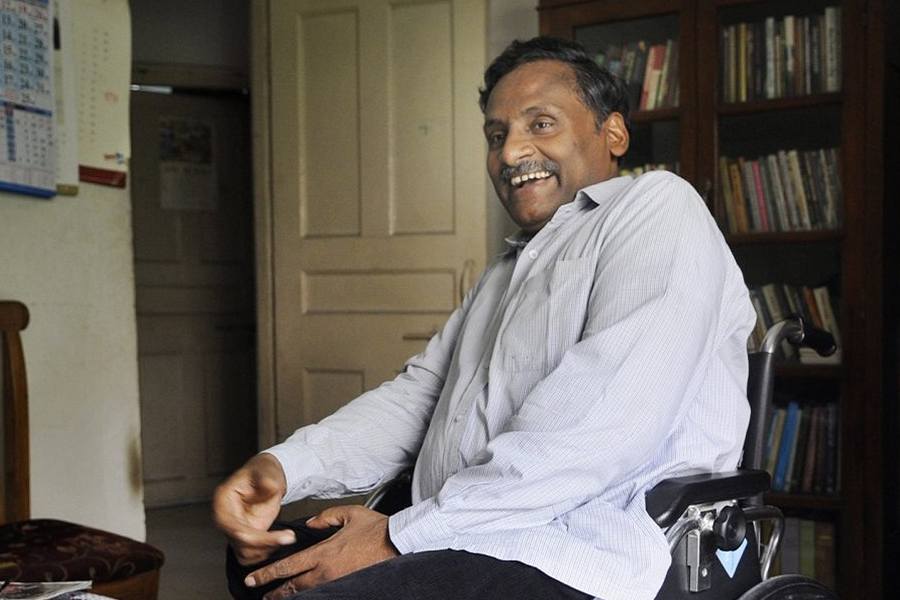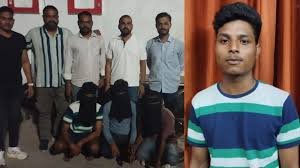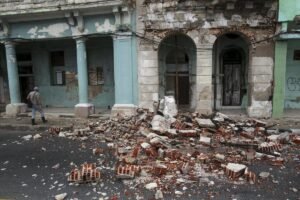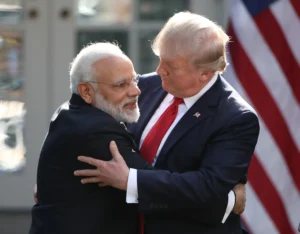Ex-Professor GN Saibaba Dies Months After Acquittal In Maoist Links Case

Former Delhi University professor GN Saibaba passed away on October 12, 2024, at the age of 57, due to complications following gallbladder surgery. His death occurred just seven months after his acquittal in a high-profile case involving alleged links to Maoist groups.
Background
GN Saibaba was arrested on May 19, 2014, by a joint team from Maharashtra and Andhra Pradesh police, along with the Intelligence Bureau. He was accused of having connections with the banned Communist Party of India (Maoist) and was subsequently imprisoned in Nagpur Central Jail. In March 2017, he was convicted alongside five others for activities considered to be waging war against the nation and sentenced to life imprisonment.However, in March 2024, the Nagpur bench of the Bombay High Court acquitted Saibaba and his co-defendants, stating that the prosecution had failed to prove its case beyond a reasonable doubt. The court also declared the sanction for charging them under the Unlawful Activities (Prevention) Act (UAPA) as “null and void”
Health Issues and Hospitalization
In the months leading up to his death, Saibaba faced significant health challenges. He had been wheelchair-bound for years due to a disability and alleged mistreatment while incarcerated. Reports indicated that he suffered from a gallbladder infection and underwent surgery about two weeks prior to his passing. He had been admitted to Nizam’s Institute of Medical Sciences (NIMS) in Hyderabad for treatment and was in critical condition before his death .
Circumstances of Death
Saibaba’s health deteriorated rapidly following surgery. He was wheeled into the ICU shortly before his death and reportedly suffered a heart attack around 8 PM on October 12. He was declared dead shortly thereafter . His family and friends expressed their grief over his passing, highlighting the loss not only to them but also to society at large.
Legacy
GN Saibaba’s case garnered significant media attention and sparked debates about civil liberties, academic freedom, and human rights in India. His allegations of being targeted for his political beliefs resonated with many who viewed him as a symbol of resistance against state repression. Following his acquittal, he had spoken out about his experiences in prison, claiming that he had been denied adequate medical care during his incarceration .His death marks a poignant end to a tumultuous chapter in Indian academia and activism, leaving behind a legacy that will likely continue to inspire discussions on justice and human rights in India.
What were the main allegations against GN Saibaba in the Maoist links case

GN Saibaba, a former professor at Delhi University, faced serious allegations in a case linked to Maoist activities. Here are the main points regarding the allegations against him:
Key Allegations
- Membership in Banned Organizations: Saibaba was accused of being a member of the banned Communist Party of India (Maoist) and its frontal organization, the Revolutionary Democratic Front. This membership was central to the prosecution’s case against him and his co-accused.
- Criminal Conspiracy: He was charged with criminal conspiracy to wage war against the Government of India through unlawful activities involving violence. The prosecution claimed that Saibaba and others were involved in planning and facilitating actions that threatened national security.
- Facilitating Meetings: Saibaba was specifically accused of arranging meetings between other accused individuals—such as JNU student Hem Mishra and journalist Prashant Rahi—and members of Maoist groups. This allegation suggested that he played a pivotal role in connecting individuals who were allegedly involved in anti-state activities.
- Seizure of Evidence: During police investigations, various documents, a hard disk, and pen drives were reportedly seized from Saibaba’s residence. The prosecution argued that this material provided evidence of his involvement in Maoist activities.
- Conviction and Sentencing: In March 2017, a Maharashtra sessions court convicted Saibaba and five others for their alleged roles in Maoist activities, sentencing them to life imprisonment. The court found them guilty based on the presented evidence, which included claims of their active participation in waging war against the state.
Legal Proceedings
- Following his conviction, Saibaba appealed the decision, leading to a prolonged legal battle that culminated in his acquittal by the Bombay High Court in March 2024. The court ruled that the prosecution had failed to prove its case beyond a reasonable doubt and noted significant procedural flaws, particularly concerning the validity of the sanction under the Unlawful Activities (Prevention) Act (UAPA) used to prosecute him. These allegations and subsequent legal proceedings highlight the contentious intersection of academic freedom, civil liberties, and national security in India.
How did the court justify the acquittal of GN Saibaba and the other accused

The Bombay High Court justified the acquittal of GN Saibaba and the other accused in the Maoist links case based on several key legal findings:
1. Failure to Prove Case Beyond Reasonable Doubt
The court emphasized that the prosecution did not meet its burden of proof. It concluded that there was insufficient evidence to establish the guilt of Saibaba and his co-accused beyond a reasonable doubt, which is a fundamental requirement in criminal law.
2. Invalid Sanction for Prosecution
A significant aspect of the court’s ruling was its determination that the sanction to prosecute under the Unlawful Activities (Prevention) Act (UAPA) was invalid. The court noted that the sanction was granted after the trial had already commenced, violating Section 45(1) of the UAPA, which requires prior approval before charges are framed . This procedural misstep rendered the entire prosecution null and void.
3. Violation of Due Process
The court found that the trial process itself violated mandatory legal provisions, which amounted to a failure of justice. It highlighted that proper procedures were not followed during the trial, casting doubt on the legitimacy of the proceedings against Saibaba.
4. Doubtful Seizure of Evidence
The court scrutinized the evidence presented by the prosecution, particularly regarding the seizure of materials from Saibaba’s residence. It deemed the search and seizure process questionable, indicating a lack of transparency and potential manipulation in how evidence was gathered . The prosecution failed to prove that any incriminating material was legally obtained.
5. Statutory Presumption and Literature Possession
The High Court rejected the prosecution’s argument that possession of certain Maoist literature constituted an offence under UAPA. It clarified that mere possession of such literature does not imply criminal activity, especially given that such materials are widely accessible online . The court maintained that statutory presumptions under UAPA should not apply in this context as Saibaba was not charged under specific sections that warranted such presumptions.

Conclusion
The acquittal of GN Saibaba and his co-accused by the Bombay High Court marks a significant moment in the ongoing discourse surrounding civil liberties, academic freedom, and the application of anti-terror laws in India.
The court’s decision highlighted critical issues related to the prosecution’s failure to provide compelling evidence, procedural irregularities, and the importance of adhering to legal standards.Saibaba’s case has not only drawn attention to the complexities of legal proceedings in cases involving alleged links to extremist groups but also raised broader questions about the treatment of dissenting voices in academia and society. His journey from conviction to acquittal serves as a reminder of the delicate balance between national security and individual rights, emphasizing the necessity for transparency and fairness within the judicial system.As discussions continue about the implications of this case, Saibaba’s legacy will likely influence future debates on human rights, freedom of expression, and the role of academia in political discourse in India. His story resonates with many who advocate for justice and seek to protect civil liberties in an increasingly complex socio-political landscape.
Discover more from
Subscribe to get the latest posts sent to your email.







